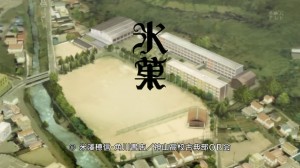
(This review may contain spoilers for the following series. If you have not seen the series before, please exercise caution before viewing this post. You have been warned.)
Ah Hyouka, I began this series with minimal hope, as my dreams were crushed with Kyoto Animation’s direction toward everyday, short stories about students doing daily tasks. However, the first few episodes actually managed to capture my interest and create some reason to watch the following episode. Week after week I would see the new episode pop up, and I would take it upon myself to view this rather interesting series to see what, if anything, would happen this week.
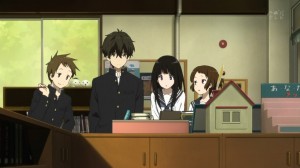
The series, for the most part, succeeded in holding my interest and moving the current plot along. The main story of Hyouka involves a young first year high school student by the name of Houtarou Oreki, who joins the “Classics Club” due to his older sister’s wishes. After signing up for the club and entering the room for the first time, he meets Eru Chitanda, another first year who happens to join the club, regardless of the fact there are no other “official” members. This meeting begins the start of the Classics Club, and after two others join the club, both “friends” of Oreki, the true antics and shenanigans begin.
I rather enjoyed how the series played itself out. It never really had a big story behind it. The entire series consisted of sub-stories that overall make up the entirety of Hyouka. The beginning of the series consists of two one-episode stories, each of which get the viewer into the flow of how the series will work. Once these two episodes have concluded, the series begins an arc that revolves around the history of the Classics Club, and what mysteries went down during the first years of the club. The story lasts a reasonable amount of episodes, and personally, I feel the conclusion successfully closes the arc neatly.
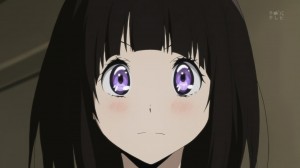
While there are small episodes in between, the next big arc revolves around a movie being created for the school festival. This arc is arguably my favorite, only because it demonstrates how limited Oreki’s skill is. He can’t solve everything without messing up sometime. While this arc shows the true potential behind Orkei’s brain, it does show how much others rely on his skill and what power he really does hold, even if he doesn’t realize himself.
Actually, while I’m going in order, episode 11.5 had nothing to do with the arc surrounding it. Therefore, it can clearly be classified as “filler” or “fanservice.” Either way, I didn’t mind this episode. While I enjoyed the plot-centric focus of this series, a break every now and again refreshes the mind, and helps people catch up to what’s happening in the main story. Not to mention, there was a mini story in this episode, and although it was painfully obvious, it didn’t detract itself too far away from the series.
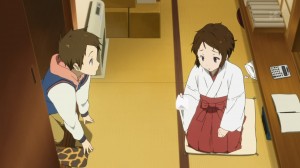
Lastly, we have the final main arc, the Cultural Festival. This arc really develops the side characters in the same way I felt the previous arc developed Oreki’s character. Other characters start to progress their emotions and show that they actually react to what’s happening in the world. Fukube, Oreki’s best friend, actually begins to show jealousy toward Oreki’s skill, and how he feels inferior to those who have bested him. Ibara, another friend of Oreki, begins to show how her relations to the Manga Society have gotten, and how distances she herself is from the others. It’s rather interesting seeing these reactions in this show, and only drives the plot forward.
Unfortunately, this all crashes down during the last few episodes. As this series only contained twenty-two(22) episodes, there wasn’t enough room to fit another full-fledged arc in. Therefore, the last few episodes consisted of small, one episode stories. While this didn’t detract from the series, it failed to add more development and progress of significance to this show. Also, this resulted in a rather abrupt ending, which left many viewers confused, including myself. I want series to conclude, and when one fails to do so, my impression of the show drops significantly. While the show’s story has a whole was interesting and intriguing, the ending really crashed down on my expectations.
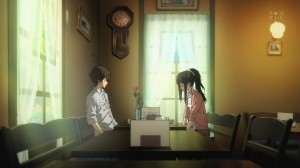
Animation-wise, this series was animated by Kyoto Animation, and as such, you would expect nothing less than perfection. Of course, this series is beautiful, and I feel like my eyes were given new life every time I watched a new episode. Every scene feels full of life and detail, and for a mystery anime, this important detail really adds to the series. Music-wise, I can’t remember much of the background music, but I didn’t mind the OP/ED of this show. I can’t remember the songs off the top of my head, and that really shows that I didn’t care too much for this show’s soundtrack. That trait is rather odd, as I find myself attracted to most series’ OP/ED.
Would I recommend this series? Put plainly, (yes). The story was great, although it ended abruptly, and the animation is excellent. Although I can’t say I remember most of the music from this series, I do know it doesn’t detract from the show, and the show has its priorities straight. There are times when the OP doesn’t play to allow more time for the story, and honestly, this helps give enough time for the development of plot. If you want a new mystery anime with a great plot and beautiful animation, then give Hyouka a shot.
-Ace
Hyouka ED2